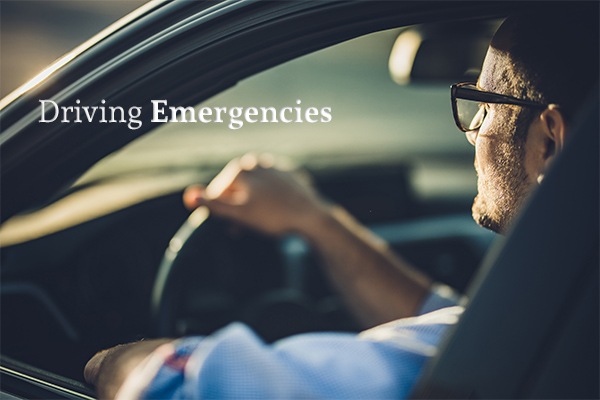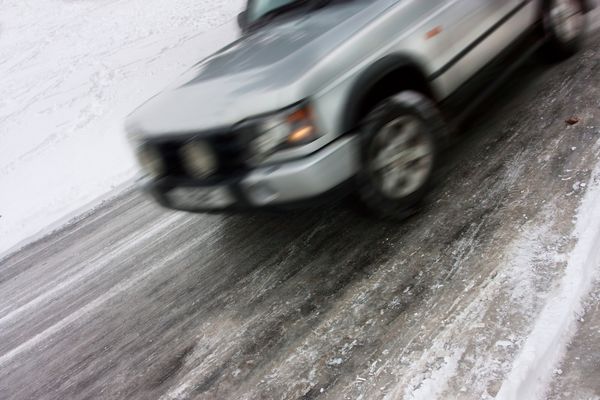
Table of contents
Even the most careful drivers can find themselves in emergency situations. A sudden tire blowout, a stuck accelerator, or even a patch of black ice can turn a peaceful commute into a complete disaster in an instant. By being aware of a few of the most common driving emergencies and how to handle them, you’ll have a better chance of avoiding a serious vehicle accident.
How to Handle A Tire Blowout
Experiencing a sudden tire blowout can be scary. Not only is the popping of the tire jolting, but not knowing how to respond can send your stress level through the roof. Knowing how to respond during a tire blowout can significantly reduce your chances of getting into a car accident. Here are the steps you need to take when you experience a tire blowout.
Despite what your instincts might tell you, do not slow down. Doing so can result in your car spinning out, causing you to lose complete control and an accident to be almost inevitable. The best thing to do is to keep your foot on the accelerator and keep driving your car straight. The friction of the lost tire will naturally slow you down. Once your car has coasted nearly to a stop, you can safely move over to the shoulder of the road. Make sure to turn your hazards on as soon as your tire blows to alert the drivers around you.
How to Handle Tread Separation
If the tread of your tires is beginning to become undone, you will need to handle it similarly to the tire blowout. When this happens, apply some light pressure on the gas pedal and continue to drive straight. Turning left or right can result in your car losing traction and spinning out.
Coast for as long as you can and only apply the brakes when necessary, such as to avoid hitting another car. Once your car has slowed down enough, begin to turn gently towards the shoulder of the road that is on the side of the ruined tire if you can. This keeps whoever is going to change the tire from being exposed to the street, reducing the risk of them or you getting struck by another car.
How to Handle Hitting a Patch of Black Ice or Slick Roads

Black ice or slick roads from rain can be terrifying because you never see them coming. If you don’t know how to react, your car could suddenly skid out of control and lead to a serious accident.
When you encounter black ice or slick roads, do not slam on the brakes. Instead, take your foot off the accelerator and tap the brake pedal repeatedly and lightly. When your car skids, it is a signal that your front wheels have lost traction. To correct this, gradually steer your car in the direction of where you want your car to stop.
Hernandez Law Group Insight: Why Should I Tap My Brakes and Not Slam Them?
Slamming your brakes is an almost sure-fire way to get into a spin-out. Your car’s tires will quickly lose traction on the road. By gently pumping the brakes, you give your car the ability to gain traction on the road and can help ease your car into a complete stop.
How to Handle A Stuck Accelerator
No matter what speed you’re traveling at, a stuck accelerator can be frightening. Oftentimes, accelerators become stuck when the floor mat or a shoe slides forward and gets lodged near the gas pedal, thus pressing and holding it down.
In some cases, simply tapping the pedal a few times with your foot may be enough to dislodge whatever has gotten stuck and help you regain control of your vehicle. If this doesn’t work quickly, however, you will need to shift your car into neutral. This will immediately kill the acceleration.
Important Note: Don’t be alarmed if your car starts making a loud revving noise. It is doing this because the car is in neutral but the gas pedal is stuck. While the noise is scary and off-putting, it isn’t going to hurt your engine, so don’t panic.
Once your car is in neutral, you will want to gently tap your brakes repeatedly and turn on your hazard lights until you’re able to slow down and pull off to the side of the road.
How to Handle Engine Fire
While rarer than some of the other emergencies on this list, an engine fire is an extremely dangerous situation that all drivers should know how to handle. If you notice smoke coming out of the hood of your vehicle, do not panic.
You will need to pull off the roadway as safely and quickly as possible. Next, turn the car off and evacuate it immediately. Do not worry about going back to get any possessions. Instead, make sure you evacuate small children who may not be able to exit the vehicle themselves and any pets.
Move you and your family as far away from the car as possible and call for help. Do not reapproach the vehicle and try to put the fire out yourself. The risk of the fire reaching the gas tank is higher under these circumstances and can result in your car exploding. Trained emergency personnel will know how to safely put the fire out and reduce the risk of injury and casualty.
How to Handle Brake Failure
When the brakes on a vehicle fail, every second counts, so knowing how to respond is vitally important.
There are several different reasons why your brakes can fail but oftentimes, it is due to loss of pressure. You may be able to re-establish pressure by pumping the brake pedal. If this doesn’t work, but you still have time to slow down, you can shift your car into neutral and coast to a stop.
Unfortunately, you won’t always have lots of time to come to a stop when your brakes fail. If you need to stop immediately, use your parking brake. The key is to pull down on it gently to avoid losing control of your car.
As a last resort, you may also be able to slow your speed by guiding your car to scrape against something such as a curb or a guardrail. The friction will help slow down the speed of your car. While this technique will cause some damage, it is better than getting into an accident with another vehicle or colliding with something head-on.
How to Handle Road Rage
When another driver becomes upset or angry either from something that you have done or something they perceived that you have done, do not engage with them. The best thing to do is to keep yourself as far away as possible. Do not pull over to talk to them or reciprocate their behavior.
What Should I Do If I Have Been in an Accident?
There are several things you should do after you have been in an accident to protect yourself, the other drivers, and your passengers from further harm. Here are the steps you should take:
- Move Your Car: If you can do so safely, move your car to the side of the road where the accident happened. This will keep you and your passengers safe.
- Turn On Your Hazard Lights: This will alert other drivers to your situation and reduce the risk of being struck by another vehicle.
- Check on the Other Drivers and Passengers for Injuries: It’s important to check yourself and the other individuals involved in the accident to ensure that there are no serious injuries. If there are, call emergency services right away.
- Call the Police: The police will assess the situation and make a car accident report. That report may be important for insurance purposes, so it is best to involve the police even if everyone involved in the accident is behaving amicably at the time.
- Gather Information About the Crash: This information should include the following:
- Name of the drivers involved and their contact information
- License plate numbers
- Insurance information
- Makes and models of the vehicles
- Witness statements and contact information
- The location and time of the accident
- Take Pictures of the Accident: This will be used as documentation to help reconstruct what happened.
- Call a Car Accident Attorney: Make sure to call a trustworthy car accident attorney. They’ll be able to look out for you while you get your bearings.
- Visit a Medical Professional: Even if you think you are fine, you will need to see a healthcare professional to make sure. Sometimes adrenaline can mask the pain of an injury.
DFW, Abilene, and Amarillo’s Most Trusted Car Accident Attorneys
If you find yourself in an accident, the team at the Hernandez Law Group, P.C. can provide the legal help you need to get the compensation you deserve. Juan Hernandez is board certified in personal injury law, which is a distinction that only 2% of Texas attorneys can claim. We’re conveniently located in the city of Abilene, with offices in Dallas and Amarillo as well, so make sure to contact us today for more information to set up your consultation.
